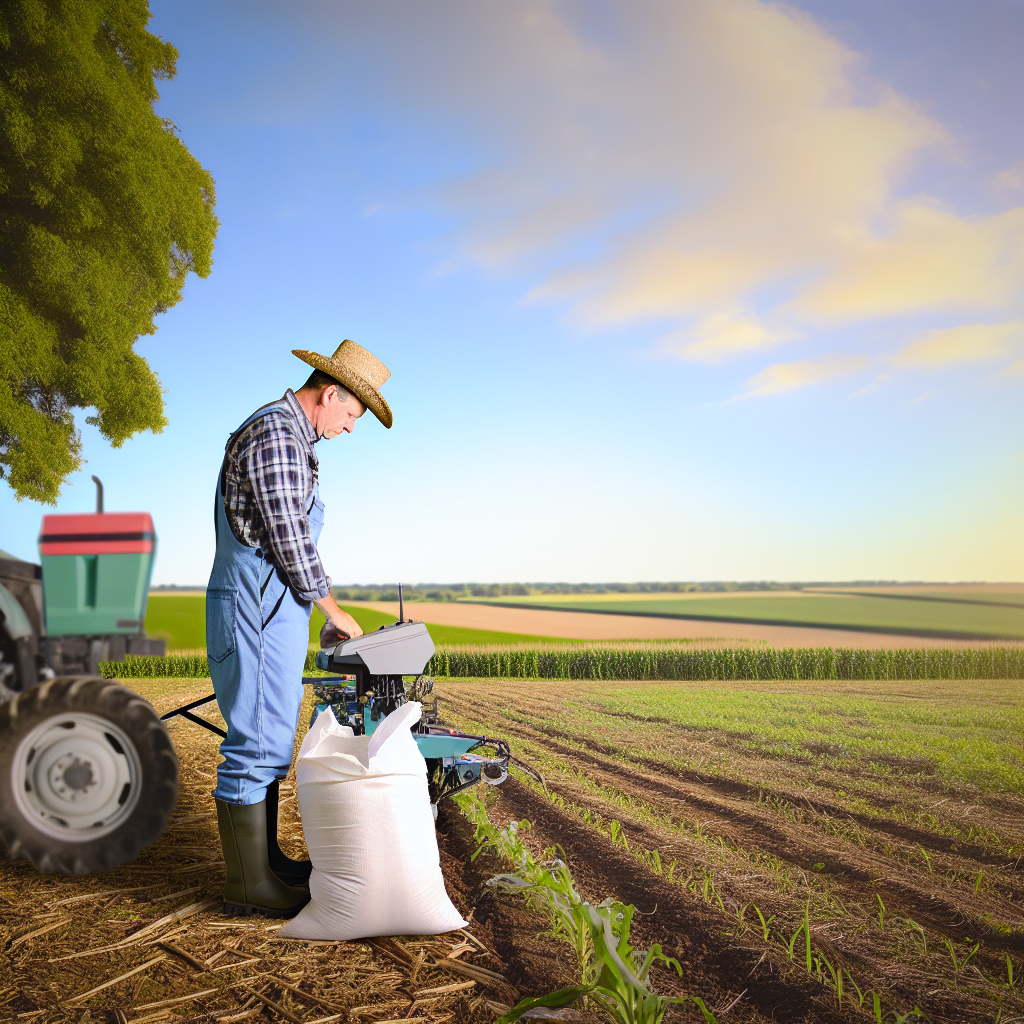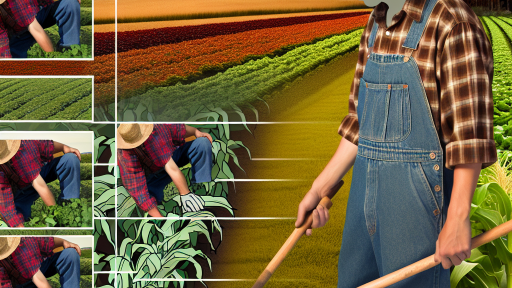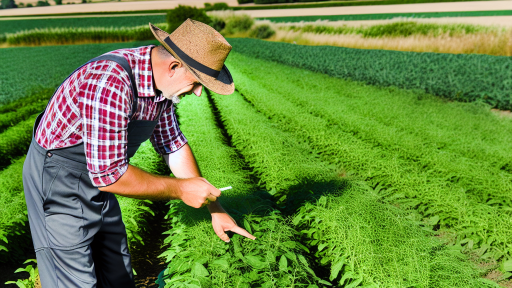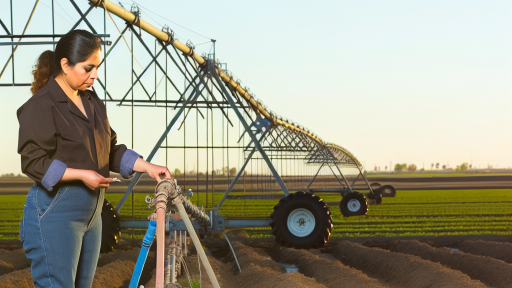Introduction to Farm Efficiency and Waste Management
Farm efficiency directly impacts productivity and sustainability.
Effective waste management plays a crucial role in achieving this efficiency.
Understanding how waste affects operations is essential for farmers.
Farmers can optimize resources by managing waste properly.
Understanding Farm Efficiency
Farm efficiency revolves around maximizing outputs while minimizing inputs.
It involves careful planning and resource management.
Efficient farms can produce more food with less effort.
Additionally, they reduce costs and increase profits.
Each farm must evaluate its unique circumstances and resources.
The Role of Waste Management
Waste management involves the collection and processing of unused materials.
This practice reduces the negative impact on the environment.
Farm waste can include crop residues, animal by-products, and packaging materials.
Proper waste management recycles resources back into the production cycle.
Farmers can thus reduce waste costs and enhance soil health.
Benefits of Integrating Efficiency with Waste Management
Combining farm efficiency with waste management yields significant advantages.
Transform Your Agribusiness
Unlock your farm's potential with expert advice tailored to your needs. Get actionable steps that drive real results.
Get StartedIt leads to cost savings, increased productivity, and improved sustainability.
Farmers can enhance their reputation by adopting eco-friendly practices.
Additionally, consumers often prefer farms that prioritize waste management.
Ultimately, this integration supports long-term farm viability and profit.
Types of Waste Generated in Farming Operations
Organic waste includes crop residues and animal manure.
The decomposition of this waste can produce valuable compost.
Additionally, it enhances soil fertility and structure.
Chemical waste arises from pesticides and fertilizers.
Farmers must manage these chemicals properly to avoid pollution.
Improper disposal can lead to soil and water contamination.
Plastic waste includes containers, bags, and greenhouse coverings.
This type of waste contributes significantly to environmental harm.
Recycling and reusing plastic materials can reduce this impact.
Electronic waste accumulates from obsolete farming equipment.
Examples include broken sensors and outdated machinery.
Proper disposal or recycling of electronics limits toxic residue.
Food waste results from unsold crops and processed food rejects.
This waste can be repurposed for animal feed or composting.
Reducing food waste ultimately benefits local ecosystems.
Benefits of Effective Waste Management for Farms
Improved Resource Utilization
Effective waste management enhances resource utilization on farms.
Farmers can convert waste into valuable resources through composting.
Moreover, recycling materials reduces the need for new inputs.
This practice ultimately lowers operating costs while preserving resources.
Enhanced Soil Health
Implementing waste management promotes healthier soil.
Showcase Your Farming Business
Publish your professional farming services profile on our blog for a one-time fee of $200 and reach a dedicated audience of farmers and agribusiness owners.
Publish Your ProfileComposting organic waste enriches soil nutrients significantly.
Healthy soil leads to better crop yields and resilience.
Consequently, farms experience fewer pest and disease problems.
Reduced Environmental Impact
Proper waste management minimizes environmental harm.
It prevents pollutants from entering waterways and ecosystems.
By recycling and reusing materials, farms generate less waste overall.
This approach complies with environmental regulations effectively.
Economic Benefits
Effective waste management can provide substantial economic advantages.
Cost savings arise from reduced waste disposal fees.
Farmers can also generate additional revenue by selling compost.
Furthermore, improved farm efficiency boosts overall profit margins.
Improved Public Image
Effective waste management enhances a farm’s public perception.
Consumers increasingly prefer sustainable farming practices.
A positive image attracts more customers and boosts sales.
This reputation can lead to stronger community relationships and partnerships.
Gain More Insights: Crop Rotation Methods to Enhance Farm Sustainability
Innovative Waste Management Techniques in Agriculture
Reducing Waste at Source
Farmers can significantly cut waste by employing better planning techniques.
Crop rotation helps optimize soil use and reduces excess waste.
Additionally, careful assessment of crop needs prevents overproduction.
Composting Organic Waste
Composting transforms organic waste into valuable fertilizer.
This process enhances soil quality and increases crop yields.
Moreover, it minimizes landfill contributions and greenhouse gas emissions.
Implementing Precision Agriculture
Precision agriculture utilizes technology to enhance crop efficiency.
Sensors and drones provide real-time data on field conditions.
Farmers can then adjust practices to reduce waste and maximize outputs.
Recycling Agricultural Plastics
Plastic waste in agriculture poses a significant challenge.
However, recycling initiatives can mitigate this problem.
Farmers can collect and send plastics to specialized recycling programs.
Utilizing Anaerobic Digestion
Anaerobic digestion converts organic materials into biogas.
This process not only generates energy but also produces nutrient-rich digestate.
Farmers can use digestate to enhance soil health.
Partnering with Local Waste Management Services
Collaboration with local waste management helps in efficient disposal.
Such partnerships can provide farmers with resources and support for waste reduction.
Consequently, farmers can focus on sustainability practices.
You Might Also Like: Organic Farming Methods To Improve Soil Health
Regulatory Framework and Compliance for Waste Management
Understanding Waste Management Regulations
Waste management regulations play a crucial role in agricultural sustainability.
They govern how farms handle, store, and dispose of waste materials.
Moreover, these regulations ensure public health and environmental safety.
Key Regulatory Agencies
Several agencies oversee waste management in the agricultural sector.
The Environmental Protection Agency (EPA) sets national standards.
Showcase Your Farming Business
Publish your professional farming services profile on our blog for a one-time fee of $200 and reach a dedicated audience of farmers and agribusiness owners.
Publish Your ProfileState departments of agriculture enforce these standards locally.
Additionally, local governments implement specific compliance measures.
Compliance Requirements
Farmers must adhere to various compliance requirements to avoid penalties.
These requirements often include waste characterization and handling procedures.
Record-keeping is essential to demonstrate compliance with regulations.
Furthermore, farmers should undergo regular audits to ensure adherence.
Impact of Non-Compliance
Non-compliance can result in significant financial penalties for farmers.
Fines can escalate, depending on the severity of the violation.
Additionally, non-compliance may lead to loss of operating licenses.
Reputation damage can also occur, impacting future business opportunities.
Sustainable Practices for Compliance
Farmers can adopt sustainable practices to improve waste management compliance.
- Implementing composting systems can reduce organic waste.
- Utilizing bioenergy technologies can help manage waste effectively.
- Training staff on proper waste disposal procedures is essential.
These practices not only aid compliance but also enhance farm efficiency.
Future of Waste Management Regulations
Regulatory frameworks are evolving to address new agricultural challenges.
Future regulations may focus on reducing greenhouse gas emissions from waste.
Farmers should stay informed about upcoming changes in legislation.
Proactive measures can prepare them for compliance with future standards.
Gain More Insights: Biodiversity’s Role In Sustainable Soil Health

Case Studies of Successful Waste Management Practices
Innovative Techniques in Organic Farming
Green Acres Farm implemented composting to manage organic waste effectively.
This method reduced waste volume by 50% within a year.
Farmers used the compost to enrich soil health, boosting crop yields.
Consequently, they enhanced their overall sustainability.
Moreover, the composting process attracted beneficial insects and microbes.
As a result, pests naturally diminished, minimizing pesticide use.
Transforming Manure into Energy
Sunnydale Farms adopted anaerobic digestion for manure management.
This transformation generates biogas, providing energy for the farm.
Subsequently, they reduced greenhouse gas emissions significantly.
Furthermore, they used the digestate as fertilizer, enhancing soil fertility.
This closed-loop system demonstrates efficient waste recycling.
Implementing Zero Waste Policies
Urban Fields Project focused on achieving zero waste in urban agriculture.
They established guidelines for waste recycling and reduction.
As a result, they diverted over 80% of waste from landfills.
Community involvement played a critical role in this success.
Workshops educated local residents on sustainable practices.
Consequently, the community embraced eco-friendly farming methods.
Utilizing Crop Residue Efficiently
Harvest Ridge Farms used crop residue as livestock feed.
This practice minimized waste and provided nutritional benefits for animals.
Additionally, they explored bioenergy options using agricultural residues.
This strategy not only reduced waste but also created new revenue streams.
As a result, they achieved both economic and environmental benefits.
Collaborating with Local Businesses
Fresh Produce Company partnered with a local bakery for waste sharing.
Showcase Your Farming Business
Publish your professional farming services profile on our blog for a one-time fee of $200 and reach a dedicated audience of farmers and agribusiness owners.
Publish Your ProfileThey used bakery scraps as feed for their hens.
In return, the farm provided eggs back to the bakery.
This collaboration minimized food waste for both entities.
Such partnerships can encourage community sustainability efforts.
Learn More: Precision Irrigation Systems for Modern Farms
Technological Solutions for Monitoring and Managing Waste
Introduction to Waste Management Technology
Waste management technology enhances farm efficiency.
It provides real-time insights into waste generation.
Moreover, it helps farmers make informed decisions.
Types of Waste Management Technologies
Many technologies are available to manage farm waste effectively.
IoT-enabled devices monitor waste levels continuously.
Automated systems can sort and process waste materials.
Software solutions provide analytics for waste reduction.
IoT Devices
IoT devices track waste accumulation across farms.
They send alerts when waste reaches a set threshold.
Thus, farmers can respond promptly to waste issues.
Automated Sorting Systems
Automated sorting systems categorize waste efficiently.
They reduce the need for manual labor on farms.
This system increases accuracy in waste separation.
Analytics Software
Analytics software analyzes waste production patterns.
Farmers can identify waste sources and trends.
This information supports strategic decision-making.
Benefits of Implementing Waste Management Technologies
Implementing waste management technologies brings numerous benefits.
First, it reduces operational costs for farmers.
Second, it enhances environmental sustainability practices.
Additionally, it supports compliance with regulations.
Cost Efficiency
Waste management technologies lower disposal costs remarkably.
They also recover valuable resources from waste products.
Consequently, farms become more economically viable.
Environmental Impact
These technologies significantly lessen farms’ environmental footprints.
They minimize landfill dependence and greenhouse gas emissions.
As a result, farms contribute positively to local ecosystems.
Regulatory Compliance
Farmers face strict regulations on waste disposal.
Efficient waste management helps meet legal requirements.
This compliance reduces the risk of fines and penalties.
Integrating Waste Management into Sustainable Farming Practices
Importance of Waste Management
Effective waste management enhances farm efficiency.
It reduces environmental impact while promoting health.
A sustainable approach supports ecosystem balance.
Types of Waste in Farming
Farms generate various types of waste.
These include organic, inorganic, and hazardous waste.
Understanding these types is crucial for management.
Showcase Your Farming Business
Publish your professional farming services profile on our blog for a one-time fee of $200 and reach a dedicated audience of farmers and agribusiness owners.
Publish Your ProfileBenefits of Integrating Waste Management
Integrating waste management offers numerous benefits.
It reduces disposal costs for farmers.
Additionally, it can turn waste into resources.
For instance, composting converts organic waste into fertilizer.
This process enriches soil and boosts crop yields.
Techniques for Waste Reduction
Adopting specific techniques aids waste reduction.
- Practice crop rotation to improve soil health.
- Utilize cover crops to enhance soil fertility.
- Implement precision farming to minimize inputs.
These methods decrease waste and increase overall efficiency.
Compliance with Regulations
Farmers must comply with environmental regulations.
This ensures sustainable practices and minimizes penalties.
Staying informed about local laws is vital for success.
Education and Training for Farmers
Education plays a key role in effective waste management.
Farmers should seek training on sustainable practices.
Workshops and online courses offer valuable resources.
Continuous learning helps adapt to changing regulations.
Community Involvement
Engaging with the community enhances waste management efforts.
Farmers can share resources and knowledge through partnerships.
Local initiatives often promote recycling and composting programs.
Building networks fosters support for sustainable practices.
Additional Resources
Changing Farming Practices Accompany Major Shifts in Farm …
USDA Science and Research Strategy, 2023-2026: Cultivating …




